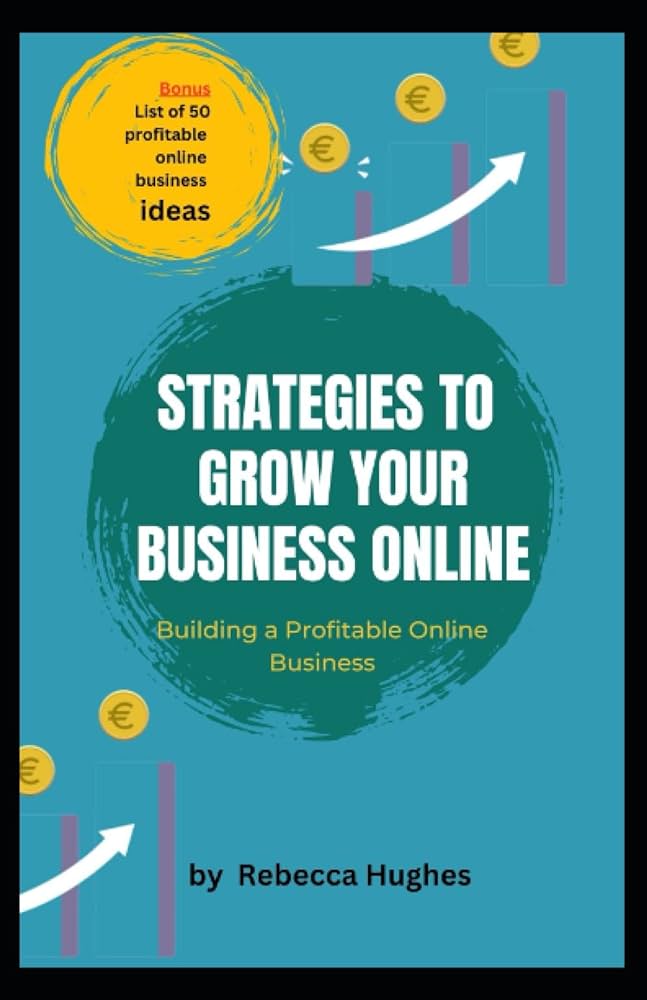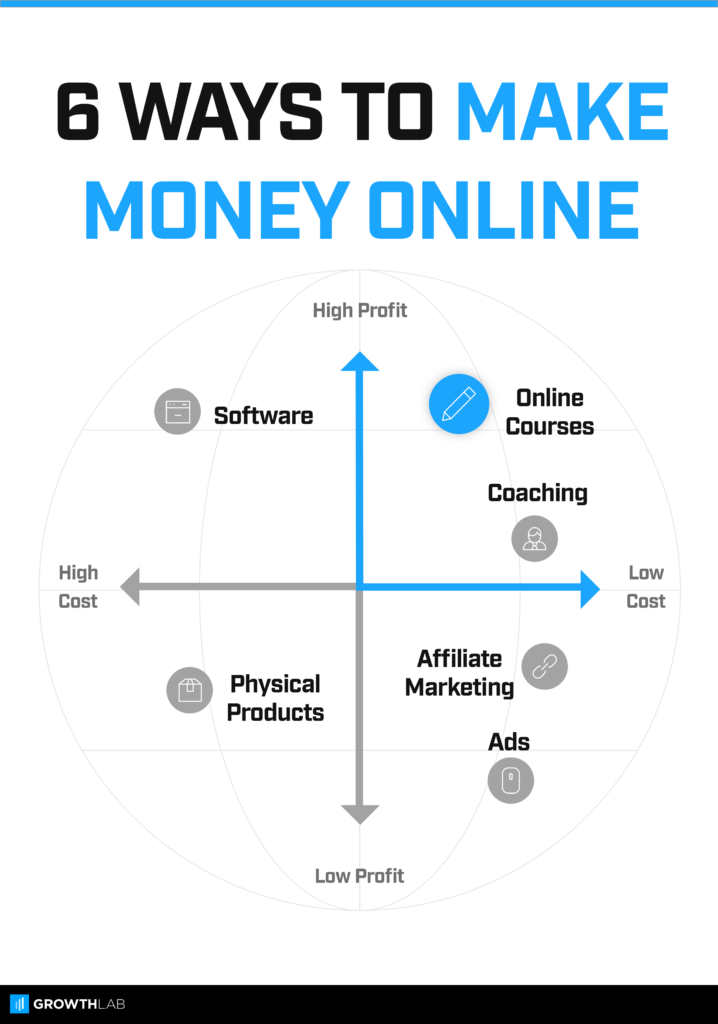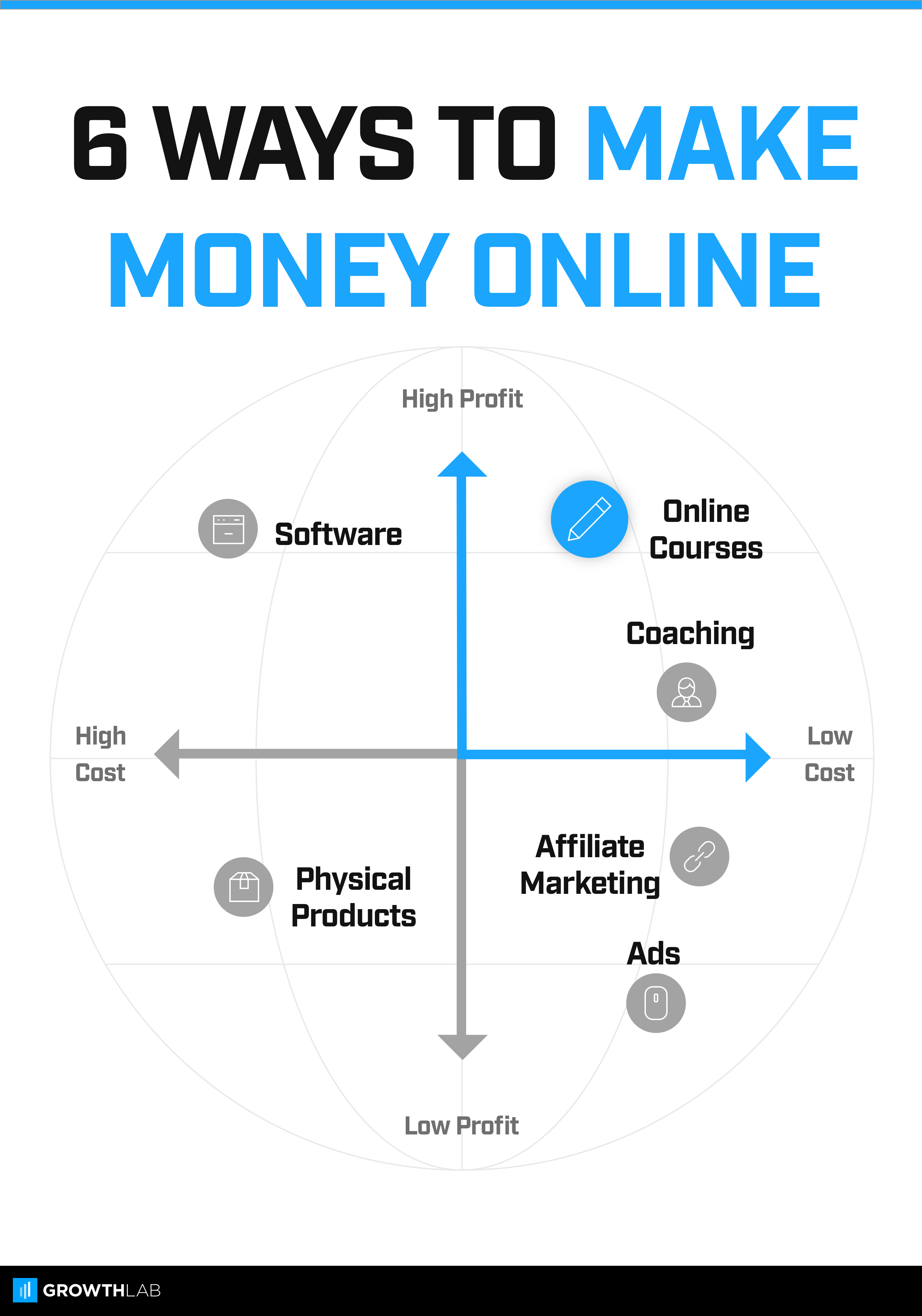If you’ve ever dreamed of building a profitable online business but weren’t quite sure where to start, look no further. This article will provide you with valuable tips and strategies that can help turn your online venture into a money-making success. From finding your niche to driving traffic to your website, we’ve got you covered. So grab a cup of coffee, sit back, and get ready to take your online business to the next level!

This image is property of Amazon.com.
Identify Your Niche Market
Conduct Market Research
Before starting an online business, it is crucial to identify your niche market. Conducting thorough market research will help you understand the demand for your products or services and determine if there is a viable market for your business idea. Research can include studying market trends, analyzing competitors, and identifying target customers. By gathering this information, you can make informed decisions about your business strategy, pricing, and marketing efforts.
Analyze Competitors
Analyzing your competitors is an essential step in building a successful online business. Identify who your main competitors are in the market and analyze their strengths and weaknesses. This will enable you to differentiate your business and provide unique value to your customers. By understanding what your competitors are doing well and areas where they might be lacking, you can position your online business to stand out and offer something different.
Identify Target Audience
Knowing your target audience is key to the success of your online business. Identify who your ideal customers are by examining demographics, interests, and purchasing behavior. This information will inform your marketing efforts and help you tailor your products, services, and messaging to meet their needs. Understanding your target audience allows you to create a more personalized and engaging experience for your customers, ultimately boosting sales and customer loyalty.
Create a Unique Selling Proposition (USP)
Define Your Unique Value
To set your online business apart from your competitors, it is essential to define your unique value. What makes your products or services special? Determine your unique selling proposition (USP) by identifying the specific benefits and advantages you offer to your customers. This could be anything from superior quality, innovative features, exceptional customer service, or a unique business model. Clearly articulate your USP so that customers understand the value they will receive by choosing your online business over others.
Differentiate from Competitors
Differentiating your online business from competitors is crucial for success. Evaluate your competition and identify gaps or areas where you can offer something different. Whether it’s through pricing, product features, customer experience, or brand positioning, find ways to stand out and offer a unique value proposition. By highlighting these differences, you attract customers who are seeking something new and compelling, giving your online business a competitive edge.
Communicate USP in Your Branding
Once you have defined your USP and differentiated your online business, it is essential to communicate this through your branding. Strong branding helps create a recognizable and memorable identity for your business. Incorporate your USP into your brand messaging, visuals, and overall communication strategy to effectively convey the unique value you offer. Consistency in branding across all channels helps build trust and affinity with your target audience, ultimately driving customer acquisition and loyalty.

This image is property of growthlab.com.
Choose the Right Business Model
E-commerce
One popular online business model is e-commerce, which involves selling products directly to customers through an online platform. This model allows you to reach a wide audience and sell a variety of physical products. Consider factors such as inventory management, order fulfillment, and shipping when setting up your e-commerce business.
Dropshipping
Dropshipping is another online business model that eliminates the need for inventory management and shipping. With dropshipping, you partner with suppliers who handle the storage and shipment of products. This allows you to focus on marketing, customer service, and driving sales. However, it is crucial to choose reliable suppliers to maintain quality and timely fulfillment.
Affiliate Marketing
Affiliate marketing involves promoting other businesses’ products or services and earning a commission for each sale or lead generated through your efforts. This model is suitable for those who want to monetize their online presence, such as bloggers or social media influencers. Selecting high-quality products within your niche and building trust with your audience is key to success in affiliate marketing.
Online Consulting
Online consulting is a business model that leverages your expertise in a particular field to provide advice, coaching, or services to clients remotely. Popular consulting niches include business coaching, marketing consulting, career counseling, and personal finance consulting. Establishing yourself as an industry expert, leveraging online platforms, and effectively marketing your consulting services are essential for success in this business model.
Digital Products
Creating and selling digital products, such as e-books, online courses, software, or graphic design templates, can be a profitable online business model. Digital products have low production costs and can be sold repeatedly without additional inventory or shipping costs. Focus on creating high-quality products and developing effective marketing strategies to drive sales.
Subscription Services
Subscription services offer customers ongoing access to products or services for a recurring fee. Examples include software subscriptions, membership websites, subscription boxes, and subscription-based content platforms. This model provides recurring revenue and builds long-term customer relationships. Creating valuable content or exclusive products and continuously adding value to your subscription service will help retain customers and drive growth.
Build an Effective Website
Select a User-friendly Platform
Choosing a user-friendly website platform is crucial for your online business. Consider factors such as ease of use, customization options, and scalability. Popular website platforms include WordPress, Shopify, Wix, and Squarespace. Evaluate each platform’s features and select one that aligns with your business needs and offers a seamless user experience for your customers.
Optimize Website Speed and Performance
Website speed and performance are vital for user satisfaction and search engine rankings. Optimize your website by minimizing page load times, compressing images, and ensuring efficient server response times. Regularly monitor website performance and make necessary improvements to provide a fast and seamless browsing experience for your visitors.
Design a Professional and Engaging Layout
An aesthetically pleasing and user-friendly website design is crucial for attracting and retaining customers. Focus on creating a professional layout that reflects your brand identity and aligns with your target audience’s preferences. Use clear navigation, appealing visuals, and concise content to guide users through your website and encourage engagement.
Ensure Mobile Responsiveness
With the increasing use of mobile devices, it is essential to ensure your website is mobile-responsive. Optimize your website’s design and functionality to adapt seamlessly to different screen sizes and devices. This will enhance the user experience for mobile users and improve search engine rankings, as mobile-friendliness is a ranking factor.
Utilize Effective SEO Strategies
Search engine optimization (SEO) is crucial for driving organic traffic to your website. Implement SEO strategies such as keyword research, on-page optimization, and backlink building to improve your website’s visibility in search engine results. By optimizing your website for relevant keywords, you can attract targeted traffic and increase the likelihood of conversions.

This image is property of adoric.com.
Develop a Strong Online Presence
Create Quality Content
Creating high-quality and engaging content is the foundation of building a strong online presence. Develop a content strategy that aligns with your business goals and target audience’s interests. Regularly create blog posts, articles, videos, or podcasts that provide value to your audience and establish your expertise in your niche. Promote your content through various channels to expand your reach and attract more visitors to your website.
Establish Active Social Media Profiles
Social media platforms offer opportunities to connect with your target audience and build brand awareness. Identify the social media platforms where your audience is most active and establish active profiles on those platforms. Share engaging content, interact with your followers, and use social media as a tool to attract visitors to your website and convert them into customers.
Engage with Your Audience
Engaging with your audience is crucial for building relationships and loyalty. Respond to comments, messages, and inquiries promptly and thoughtfully. Encourage discussions, ask for feedback, and show appreciation for your customers’ support. By actively engaging with your audience, you build trust, foster positive relationships, and create a community around your online business.
Optimize Your Website for Search Engines
In addition to implementing effective SEO strategies, optimizing your website’s content, structure, and meta tags is crucial for search engine visibility. Use relevant keywords naturally throughout your website, optimize meta titles and descriptions, and ensure proper formatting and organization of your content. Regularly monitor your website’s performance in search engine rankings and make necessary optimizations to improve visibility.
Implement Effective Marketing Strategies
Employ Search Engine Marketing (SEM)
Search engine marketing (SEM) involves running paid advertisements on search engines, such as Google Ads. SEM can help increase your website’s visibility in search engine results and drive targeted traffic. Conduct keyword research, create compelling ad copy, and optimize your campaigns to maximize your return on investment (ROI) with SEM.
Utilize Social Media Advertising
Social media advertising allows you to reach a highly targeted audience through platforms like Facebook, Instagram, and LinkedIn. Utilize the targeting options available to match your ads to your audience’s demographics, interests, and behaviors. Create engaging ad content, track performance metrics, and optimize your campaigns to drive conversions and achieve your marketing goals.
Incorporate Email Marketing
Email marketing is a powerful tool for nurturing customer relationships and driving repeat sales. Build an email list by offering valuable content or incentives to visitors who opt-in. Create personalized and engaging email campaigns that provide relevant content, exclusive offers, and updates about your products or services. Regularly analyze email metrics to refine your campaigns and maximize conversions.
Leverage Influencer Marketing
Influencer marketing involves partnering with influential individuals in your niche to promote your products or services. Identify influencers whose audience aligns with your target market and collaborate on content creation or sponsored campaigns. Working with influencers can help increase brand awareness, reach new audiences, and drive sales through their trusted recommendations.
Use Content Marketing
Content marketing involves creating and distributing valuable and relevant content to attract and engage your target audience. Develop a content strategy that aligns with your business goals and target audience’s interests. Create blog posts, videos, infographics, or podcasts that address their pain points, provide solutions, and establish your expertise. Promote your content through various channels to drive traffic and build brand authority.

This image is property of assets.entrepreneur.com.
Optimize for Conversion Rate
Utilize Effective Call-to-Actions (CTAs)
Call-to-actions (CTAs) guide users towards desired actions, such as making a purchase, submitting a contact form, or signing up for a newsletter. Create persuasive and eye-catching CTAs that clearly communicate the value of the action and encourage users to take the next step. Place CTAs strategically throughout your website to maximize conversions.
Simplify Checkout Process
A streamlined and user-friendly checkout process is essential for optimizing your conversion rate. Minimize the steps required for customers to complete their purchase, offer multiple payment options, and provide clear instructions and progress indicators. Regularly monitor the checkout process and make improvements based on user feedback or cart abandonment rates.
Utilize Conversion Rate Optimization (CRO) Tools
Conversion rate optimization (CRO) tools can help you analyze and optimize your website to increase conversions. Use tools like heatmaps, A/B testing, and user behavior tracking to identify areas for improvement and test different strategies. Continuously monitor and analyze data to make data-driven decisions and continuously optimize your website for better conversion rates.
Personalize User Experience
Personalization is key to delivering a personalized and engaging user experience. Tailor your content, product recommendations, and messaging based on user behavior, demographics, or past interactions. Use data and tools to segment your audience and deliver customized experiences that resonate with different user segments.
Offer Special Discounts or Promotions
Special discounts or promotions can be effective in incentivizing conversions and increasing customer loyalty. Offer exclusive discounts, limited-time promotions, or loyalty programs to encourage customers to make a purchase or return to your website. Regularly analyze the results of your promotions and make adjustments to optimize their effectiveness.
Focus on Customer Retention
Provide Exceptional Customer Service
Exceptional customer service is crucial for retaining customers and building loyalty. Respond to customer inquiries or issues promptly and provide solutions in a friendly and helpful manner. Aim to exceed customer expectations by going the extra mile and showing that you value their satisfaction. By providing exceptional customer service, you create positive experiences and build long-term relationships.
Implement Loyalty Programs
Loyalty programs incentivize customers to stay loyal to your brand by offering rewards, discounts, or exclusive perks. Develop a loyalty program that aligns with your business and offers valuable incentives to encourage repeat purchases or referrals. Regularly communicate with your loyal customers and provide special offers or updates to maintain their engagement.
Encourage Customer Reviews and Testimonials
Positive customer reviews and testimonials can significantly impact purchasing decisions and build trust with potential customers. Encourage satisfied customers to leave reviews or testimonials and make it easy for them to do so. Display reviews prominently on your website or social media profiles to showcase the positive experiences of your customers.
Offer Personalized Recommendations
Personalized product recommendations can enhance the shopping experience and increase customer satisfaction. Use customer data and browsing history to provide relevant product suggestions or related items that customers might be interested in. By offering personalized recommendations, you can increase the likelihood of cross-selling or upselling and drive additional sales.

This image is property of fastercapital.com.
Analyze and Track Key Metrics
Utilize Web Analytics Tools
Web analytics tools provide valuable insights into your website’s performance and user behavior. Use tools like Google Analytics or Adobe Analytics to track metrics such as website traffic, bounce rates, conversion rates, and user demographics. Regularly analyze these metrics to identify trends, optimize your marketing efforts, and make data-driven decisions.
Track Website Traffic
Tracking your website’s traffic is essential for understanding the effectiveness of your marketing efforts. Monitor the number of visitors, the sources of traffic (organic, social media, paid ads), and the pages they visit. Identify which marketing channels or campaigns drive the most traffic and focus your resources on those that deliver the best results.
Monitor Conversion Rates
Conversion rates measure the percentage of website visitors who take a desired action, such as making a purchase or filling out a form. Track conversion rates to measure the effectiveness of your marketing strategies, identify areas for improvement, and optimize your website and marketing efforts accordingly. Regularly analyze conversion rate data to make informed decisions about your business and marketing tactics.
Analyze Customer Behavior
Understanding customer behavior can help you improve user experience and make data-driven business decisions. Analyze behavioral data such as time spent on website, click-through rates, or abandoned carts to identify points of friction and areas for improvement. Use this information to optimize your website, marketing campaigns, and customer journey to increase engagement and conversions.
Measure Return on Investment (ROI)
ROI measures the profitability of your marketing investments. Analyze the cost and revenue generated from your marketing campaigns to evaluate their effectiveness. Calculate ROI by comparing the amount spent on marketing efforts to the revenue generated. This will help you identify which marketing channels or campaigns deliver the highest ROI and allocate resources accordingly.
Continuously Test and Improve
A/B Test Different Strategies and Campaigns
A/B testing involves testing different variations of your marketing strategies, website design, or ad campaigns to determine which performs better. Test various elements such as headlines, visuals, or calls-to-action to identify the most effective strategies for your business. Continuously test and optimize your marketing efforts based on the results to improve performance and drive better outcomes.
Analyze Results and Metrics Regularly
Regularly analyze and review your marketing results and metrics to assess performance and identify areas for improvement. Monitor key performance indicators (KPIs) such as website traffic, conversion rates, or customer acquisition costs. Use this data to gain insights into the effectiveness of your strategies and campaigns, and make data-driven decisions to improve your online business.
Experiment with New Marketing Tactics
The digital landscape is constantly evolving, making it essential to experiment with new marketing tactics. Stay up to date with industry trends, emerging platforms, and new marketing tools. Experiment with different strategies and channels to expand your reach, engage your audience, and stay ahead of the competition. Continuously test and refine your marketing tactics to identify what works best for your online business.
Stay Flexible and Adapt to Changes
Flexibility is crucial in the ever-changing online business landscape. Stay alert to market trends, shifts in consumer behavior, or changes in industry regulations. Be prepared to adapt your strategies, business model, or product offerings to remain relevant and meet the evolving needs of your target audience. Embrace change and innovation to stay competitive and drive long-term success.
In conclusion, building a profitable online business requires careful planning, execution, and continuous improvement. By identifying your niche market, creating a unique selling proposition, choosing the right business model, building an effective website, developing a strong online presence, implementing effective marketing strategies, optimizing for conversion rates, focusing on customer retention, analyzing and tracking key metrics, and continuously testing and improving, you can position your online business for success. Remember to stay focused, stay responsive to your target audience, and always strive to provide exceptional value and service. With dedication and perseverance, your online business has the potential to thrive and generate long-term profitability.

